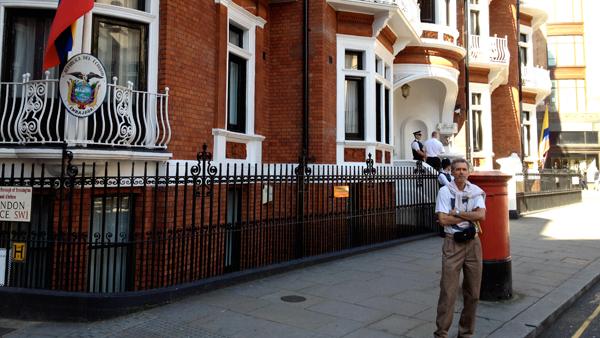On vacation in England three weeks ago, I visited Ecuador’s embassy in London and saw a building surrounded by a phalanx of cops, several of them at the front door. The intimidating police presence was ordered by a Conservative government that can wax eloquent about the need to respect embassies overseas, as long as they’re British embassies.
The intensified police deployment is only part of Britain’s response to Ecuador’s decision to grant political asylum on human rights grounds to WikiLeaks founder Julian Assange, who took refuge in the embassy two months earlier. The British government has made it clear that it will not allow Ecuador to provide safe passage and asylum to an individual who — for the “crime” of publishing — has heard powerful U.S. voices in politics and media call for his murder.
Although American newspapers have published classified documents for years, with courts deeming such publication to be protected by the First Amendment, the Democratic chair of the Senate Intelligence Committee has called for Assange to be prosecuted under the Espionage Act.
For its part, Britain says its goal is only to extradite Assange to Sweden where he is wanted for questioning on allegations of sexual assault. No formal charges have ever been filed in Sweden.
At the door of Ecuador’s rather small embassy, cops interrogated me about who I was and why I sought entry. I had to wonder if the embassy was under siege by Britain on behalf of Washington, which reportedly already has a sealed indictment against the WikiLeaks founder. Again, that’s for the “crime” of publishing, not sexual assault.
There are sensible reasons to suspect, as Ecuador does, that if Britain delivers Assange to Sweden, he will then be extradited onward to the U.S. to face prosecution related to publication of all those classified documents.
Neither Sweden nor Britain is willing to pledge that Assange will not be extradited to the U.S.
Across the street from Ecuador’s embassy, I was heartened to see (besides the journalists, cameras and satellite trucks) British citizens protesting their government’s actions and standing up for Bradley Manning, the young U.S. Army private who faces life in prison as the accused WikiLeaks leaker of the explosive documents on U.S. military and diplomatic misconduct. Among the placards I saw: “Exposing War Crimes Is Not a Crime — Free Assange, Free Manning,” “Protect Freedom to Publish” and “If Wars Can Be Started by Lies, They Can Be Stopped By Truth.”
Days before my visit to the embassy, Britain’s Foreign Office had threatened Ecuador in a letter, claiming a legal basis to go ahead and arrest Assange from the embassy after revoking the building’s diplomatic status. A prominent Conservative member of Parliament tweeted that Britain should break off diplomatic relations with Ecuador and then invade the “former embassy” to seize the WikiLeaks leader.
RootsAction.org, a U.S. activist organization I co-founded, has been circulating an online petition thanking Ecuador and protesting Britain’s threats against the embassy and refusal to uphold the right of asylum.
As the father of two daughters who traveled with me in London, I take sexual assault allegations seriously. But standing outside this embassy surrounded by British police, it looked to me like a classic case of powerful Western states uniting to intimidate a less powerful country on behalf of their prerogatives toward domination and war.
Jeff Cohen is the director of the Park Center for Independent Media and an associate professor of journalism. Email him at [email protected].








